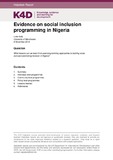Evidence on Social Inclusion Programming in Nigeria
Abstract
This rapid review has found evidence of a number of lessons from past social inclusion programming in Nigeria. Inclusion programming is understood as programmes that aim to include excluded groups in the employment market and education; as well as programmes which build the capacity of government and community based organisations (CBOs) to lobby for excluded groups and help them participate in decision-making; and those which seek to change ideas which encourage the exclusion of groups from parts of society. Despite economic growth and a transition to democracy in 1999 in Nigeria, a broad range of people are excluded from full participation in society. These include workers in the informal economy, nomadic pastoralists, ethnic and linguistic minorities, women, youth and people with disabilities (PWD) (Birchall, 2019).
Social inclusion programmes in Nigeria have sought to address these forms of exclusion by changing norms and attitudes, helping excluded individuals and groups to access the market and public services on better terms, capacity building with civil society organisations (CSOs) and government and advocacy work, amongst others. Many social inclusion aims are addressed by accountability and governance initiatives that seek to involve excluded groups in governance. This rapid literature review therefore includes evidence from a range of programmes that may involve improving inclusion, such as governance programmes, work-based initiatives and programmes to change norms, attitudes and behaviour. The review draws mostly on grey literature, most of which seeks to measure the impact of programming in terms of institutional change in CBOs and government, and attitudinal and behaviour change in citizens. It also considers some literature which analyses inclusion programming in a broader context by comparing programming strategies over time (Booth & Chambers, 2014; Punton & Burge, 2018), looking at its effect on labour markets and the experiences of informal workers (Meagher, 2015), or particular types of programming or tools for inclusion (Mann & Meagher, 2017; Wallace, 2014)
Citation
Kelly, L. (2019). Evidence on social inclusion programming in Nigeria. K4D Helpdesk Report 690. Brighton, UK: Institute of Development Studies.Is part of series
K4D Helpdesk Report;690Rights holder
© DFID - Crown copyright 2019Collections
- K4D [937]

